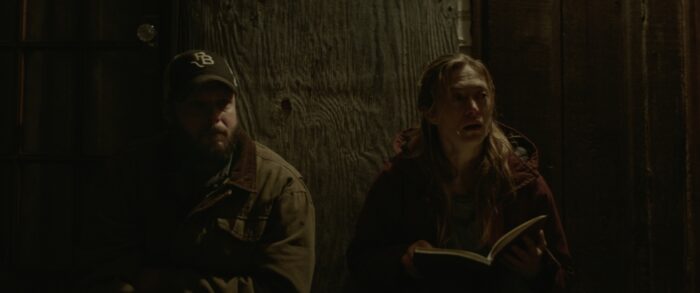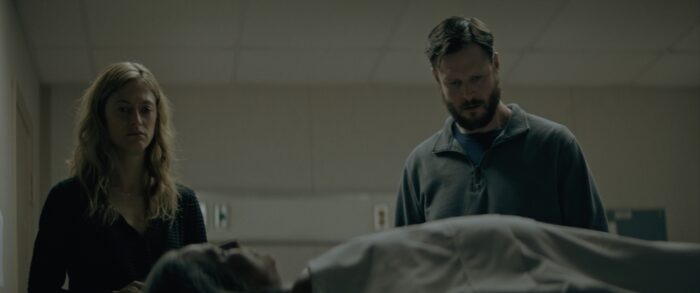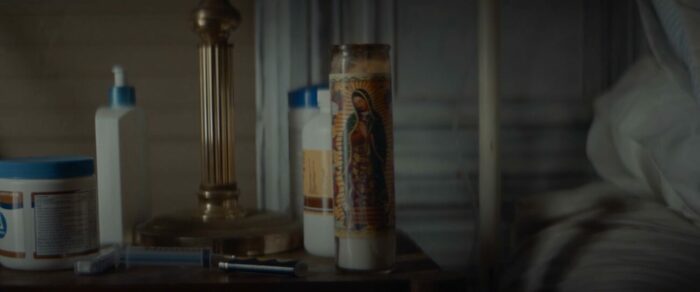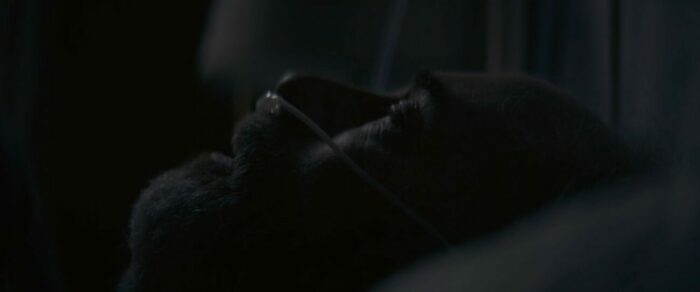Sometimes you want a feel-good horror film where good prevails over evil and all is put right with the world again. But other times, you want a dark, dreary story utterly devoid of even the tiniest bit of hope, and when you’re in that kind of mood, I highly recommend The Dark and the Wicked. It’s one of the absolute bleakest movies I’ve ever seen, and if you know who wrote and directed it, that should come as no surprise.
The Dark and the Wicked was made by Bryan Bertino, the man burst onto the horror scene with the notoriously dark home invasion classic The Strangers, and it tells a similarly grim story to Bertino’s debut. The film is about a brother-sister pair named Louise and Michael who visit their parents David and Virginia when their father becomes very sick, but soon after they arrive, they find themselves under attack by a malevolent supernatural entity that just might be the devil himself.
It has a very simple premise, but it’s executed so well that it’s one of the best horror movies of this decade. The acting is fantastic, the scares are effective, and the atmosphere is bleak as hell (almost literally!). But don’t get the wrong idea. The Dark and the Wicked isn’t just a downbeat scarefest. It’s also a really meaningful film, and in my opinion, that just might be the best thing about it. It’s a hard-hitting metaphor for the horrors of grief, so let’s take a deep dive into this fantastic movie and see how exactly it mirrors that universal human experience.
The Basic Story

Let’s start with the big picture. Like I said, The Dark and the Wicked follows two siblings who visit their ailing father, and the morning after they arrive, they find their mother hanging in the barn. It’s a really horrible situation, and that alone lets us know that this story is one big metaphor for grief. When a film inserts its supernatural chills into a more down-to-earth human story, the horror is often a metaphor for those mundane goings-on, and this one is no different.
The demon here represents the main characters’ grief at both their mother’s death and their father’s illness (which, it’s implied, is going to lead to his death pretty soon), and if there’s any doubt about that, the movie makes it pretty obvious. There’s a scene where Michael finds his mother’s diary and reads part of it, and the lines he reads tell us everything we need to know:
I know he’s there in the darkness. Help me. Help me, please. He’s killing David. He can’t breathe anymore. There’s nothing I can do to stop it. Devil, devil, devil. He wants David’s soul.
These spine-tingling words make it clear that the demon in this story is the one who’s making David sick, and that’s our smoking gun. It’s the ultimate cause of Michael and Louise’s grief, so it makes perfect sense that this thing would also represent grief on a thematic level. The connection is almost begging to be made, and as we dig deeper into The Dark and the Wicked, it’ll become almost impossible to ignore.
For example, consider the general feel of the movie. From the very first frame, it’s saturated with a dark, depressing atmosphere of hopelessness and despair, and the characters almost never look happy. In fact, once Virginia dies, the film literally becomes all bleak all the time.
Before that, there are one or two scenes that are a bit lighthearted, like when Louise arrives at the house and sees her brother and a family friend named Charlie changing a tire, but afterwards, that levity goes away entirely. The movie doubles down on its dark and dreary tone, and it doesn’t let up until the credits begin to roll. It’s the perfect vibe for a film about grief, so even aside from the narrative, the atmosphere alone makes this a spot-on metaphor.
The Effects of Grief

On top of that, if we examine the demon’s M.O., its connection to grief becomes even clearer. Unlike a lot of supernatural horror villains, this one doesn’t just do spooky things. It also kills people, and most of the time, it makes them die by their own hands. In fact, other than David and Louise, every character in The Dark and the Wicked kills themselves, and their deaths are all connected to the demon in one way or another.
For example, I already said that Virginia hangs herself in her barn, but if you pay close attention, there’s more to her death than meets the eye. Michael points out that there was no way she could’ve gotten up high enough to do it all by herself, so it’s clear that the demon had something to do with it. Similarly, the family’s friend Charlie shoots himself while encountering the entity, and David’s nurse becomes possessed and stabs herself to death.
But hands down, the most bone-chilling death in The Dark and the Wicked is Michael’s. Towards the end of the film, he leaves his parents’ house without telling Louise, and he goes home to his wife and kids. However, when he arrives, he finds them all dead in an apparent murder-suicide, and he becomes so overcome with grief that he slits his own throat right then and there.
That’s pretty dark, but what happens next is utterly devastating. Immediately afterwards, the bodies of his wife and kids disappear, and Michael realizes that he’s been tricked. The demon followed him home and made him see a vision of his family brutally killed, so it got him just like it got Virginia, Charlie, and David’s nurse. It made him kill himself too, and significantly, it used grief to do it.
That harrowing scene reminds us that when someone loses a close loved one, especially a spouse or a child, their grief can overwhelm them so much that they feel they have no reason to keep living. Granted, most of the time, they get through it, but sadly, that’s not always the case. People do sometimes kill themselves out of grief, and the way I see it, that’s the key to understanding why this entity does what it does, at least thematically. It makes people commit suicide because that’s what grief does, so again, it’s clear that this thing is in fact a metaphor for intense grief.
Grief and Religion

Next, let’s consider what just might be the most interesting thing about The Dark and the Wicked. Like many demon films, this one also has a bit of a religious streak to it, but it’s not what you’d expect. Normally in these movies, religion allows the protagonists to defeat the evil spirits that are haunting or possessing them, but this one is different.
David’s nurse and Virginia both turn to religion to protect themselves against the film’s demonic antagonist, but it doesn’t work. In fact, it’s completely useless. For example, Virginia sings spiritual hymns a few times before she dies, and we later find out that she carried around a bunch of small crosses in her pocket, but she still ends up hanging herself. Similarly, David’s nurse is shown praying and talking about prayer a few times throughout the film, and she even tries praying for deliverance while the demon is possessing her, but it still makes her commit suicide too.
Now, I’m a religious guy myself (to be specific, I’m Catholic), so you might think that the idea of religion (and especially Christianity) being ineffectual against this kind of evil would be offensive or at least a bit off-putting to me. But it’s not. In fact, I really appreciate what The Dark and the Wicked has to say about this topic. The way I see it, the movie isn’t trying to disparage religion. Rather, I think this is just another part of its metaphor for grief, and in my experience, it’s absolutely spot-on.
I’ve lost several close family members throughout my life, and every single time, my faith has helped me get through it. It gives meaning to my pain and gives me hope that my suffering won’t have the last word, but despite all that, it doesn’t make the pain go away. Losing someone you love hurts like hell no matter what you believe, so even though religion definitely helps, it can’t save you from your grief, just like it can’t save Virginia and the nurse from the demon that haunts them.
The Last Scene

Last but not least, let’s take a look at the final scene of The Dark and the Wicked. Like I said before, the only two characters in this movie who don’t kill themselves are Louise and her father, but that doesn’t mean their fates are any happier. At the end of the film, Louise finds herself alone with her dying dad, and after he takes his last breath, her grief finally becomes too much for her to bear.
She begins to weep, and then we see a dark figure embrace her. That figure is obviously the demon, but it’s not entirely clear what it intends to do. We only see it for a split second, and then the camera cuts away to the outside of her house. After that, we hear Louise scream, and the credits begin to roll. It’s admittedly a somewhat ambiguous ending, but for my money, it tells us everything we need to know. While we can’t be sure exactly what the entity does, it’s obviously something terrible, and it’s no coincidence that it happens immediately after her father dies.
As anybody who’s lost a loved one to a terminal illness knows, it’s one thing to grieve their impending death, but that grief becomes something else entirely once they actually die. As long as they’re still with you, no matter how grim their prospects are, you can still experience their presence and take solace in it. But once they die, that’s it. You’ve lost them forever, and the pain becomes excruciating.
And that’s exactly what happens to Louise at the end of The Dark and the Wicked. Sure, she grieves her father’s illness throughout the entire film, but when he dies, her pain intensifies exponentially. So like I said, it’s no coincidence that the demon chooses that exact moment to finally take her. Granted, on a narrative level, we don’t really know its motivations, but on a thematic level, the explanation is obvious. This entity is the personification of grief, so of course it claims her when her pain finally becomes too great to bear.
A Metaphor for Grief
Admittedly, we’ve only scratched the surface of The Dark and the Wicked. There’s a lot more in this movie that also fits the theme of grief, but I don’t want this article to balloon to unmanageable proportions. We’ve gone over enough of the film to make my point, so I think its main idea is pretty clear. It’s a metaphor for grief, and just about everything in it, from the overarching plot to the specific ways the demon attacks its victims, is part of that metaphor.



